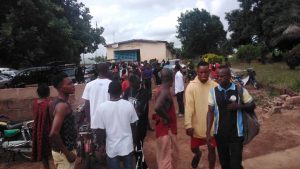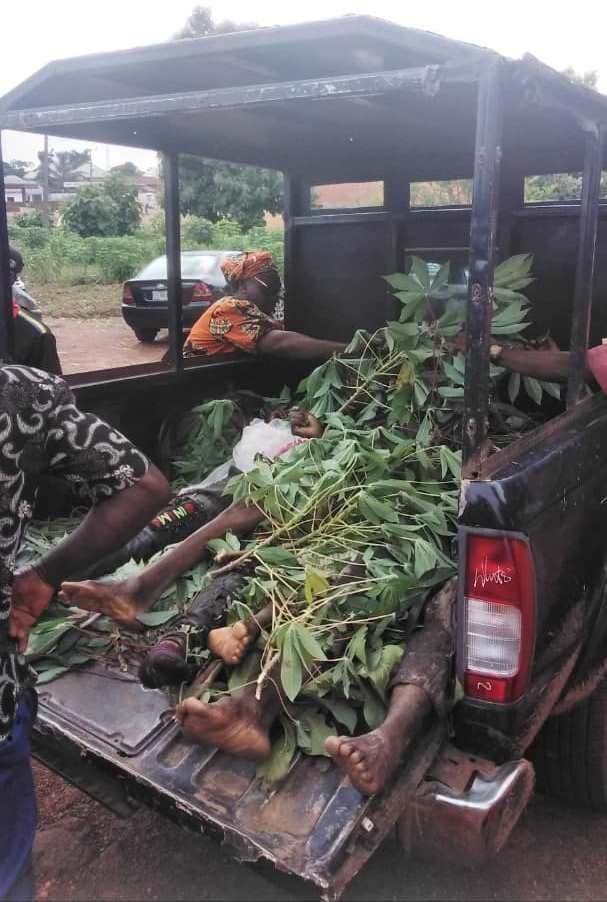The contestation over access to land between herders and farming communities in Benue State of Nigeria took a rather extra-ordinarily violent turn early morning June 12th, 2022. An early morning attack on the agrarian community of Igama not only left eleven persons dead but a better part of the entire community burnt down.
Unsuspecting eye-witnesses had sighted men on motorcycles early in the morning but did not think of an operation on such a scale. By 7 am, it was all over. Although the first set of security operatives who rushed in response to distress alarms from the village still caught the tail end of the operation, they too had to run for their dear lives as they reportedly came under attack from the mercenaries. The second set of security operatives met no suspected mercenaries anymore although some people told Intervention that a thorough search of the bushes will still show some of them up.
No local leaders from the traditional authority or the Okpokwu Local Government have been able to visit Igama yet because, as Intervention was told, everyone is still in shock about the scale of the operation. Moreover, the Local Government Council is pondering how to cope with internally displaced persons as it is not only villagers from Igama but also from nearby villages are all rushing to Ojapo – the emerging nerve centre of the lower part of the huge Edemoga District – arising from fear of the unknown. Meanwhile, Ojapo has no facilities either in terms of a modern primary school or any structures of the size and infrastructure that can cope with concentration of such a population size.

Shock and awe around Igama
Host/stranger relations between herders and farmers in that axis has not been cordial since February this year. There have been claims and counter-claims of cattle rustling or encroachment of ancestral lands, some of which were either not resolved to the satisfaction of contending parties or compounded by self-help responses.
It is not always that herders who are predominantly of Fulani identity and Muslims have no tales of raw deals, said a Devil’s advocate to Intervention. The question, as far as he is concerned is whether any side can hire mercenaries towards a violent resolution or assertion of their claims against the other. Closely tied to that question is why the Nigerian State is always missing in action in terms of anticipating and disrupting the attacks.
Although the Federal Government has stationed troops in the area since more than three months now, an action which has received considerable commendation as the military’s presence has enhanced security in the community, today’s invasion of Igama still happened. It raises questions about the funding level of these deployments and the technology with which to work. The bigger contention is the assumption that herders cannot have become so boldly reliant on violence unless this is organised by some people or organisation from the top. This is where the political dimension of the puzzle in the herder-farmer conflict in contemporary Nigeria.
The second dimension is why the host communities are almost always caught flat footed in terms of anticipating and repelling mercenary attacks. Perhaps it is too much to expect peasants to acquire the military capability to repel mercenary attacks but what if attacks of this nature has become so regular in the area. Omusu, another nearby agrarian community, had a taste of it a few years back. Fighting in self-defence is an accepted practice in communal and international co-existence.
Community leaders are asking why there has not been a meeting of political, traditional, religious and youth leaders on herder – farmer crisis in the entire District since the relationship took a violent turn from 2016? This is argued in the context of the primacy of farming in the area, historically, much of which is no longer possible since herders became more brazen in their contest for access to land and water. According to a community leader, the cows compact the land in a manner that makes much of it too hard to be made into earth mounds. Cows also eat up crops. Before, they used to pay compensation. That, it is claimed, doesn’t happen nowadays. What the farmer gets is violent self-assertion of herdsmen or scorched earth operations as has happened today in Igama and, before today, Omusu.
That is to say that the political, leadership dimension and the youth factor in this conflict is properly analysed, it would be difficult for anyone to say Igama would be the last of this cycle of violence.
In the meantime, the Divisional Police in Okpoga, the headquarters of Okpokwu Local Government Council has recovered the bodies of the eleven who were killed in the dawn raid.





























1 Comments
Philip Ogwuche
This is really dastardly. I thank Intervention for this apt reportage. The Edumoga nation is indeed endangered by the aggressive and recently emboldened Fulani jihadists. I urge the local government council to step up their collaboration and support for the Military in the area. They have done so well probably with little or no support from the incompetent council administration. Despite that, they have tried so hard to enthrone peace and tranquility in our domain. Well meaning socio-cultural Associations and individuals are encouraged to offer timely intelligence and logistics support to them as well.